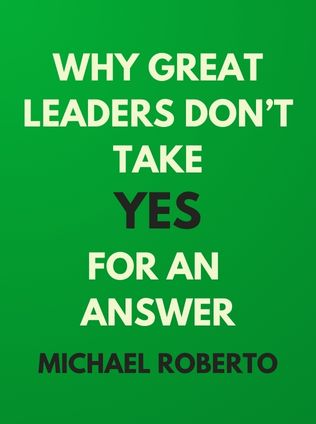
Why Great Leaders Don’t Take Yes for an Answer
Managing for Conflict and Consensus
By Michael Roberto
Published 09/2015
About the Author
Michael A. Roberto is a distinguished faculty member at Harvard Business School. His research focuses on strategic decision-making processes, senior management teams, and organizational consensus-building. Roberto has a wealth of experience in developing leaders across various organizations, including The Home Depot and The World Bank. His work is widely published in esteemed journals such as the Harvard Business Review and the California Management Review. In his book Why Great Leaders Don't Take Yes for an Answer, Roberto leverages his extensive research and practical experience to delve into the intricacies of effective leadership and decision-making.
Main Idea
The central premise of Michael A. Roberto’s book is that great leaders do not take "yes" for an answer because doing so can lead to groupthink, poor decision-making, and ultimately, organizational failure. Instead, effective leaders foster an environment where honest and constructive dissent is encouraged. This approach not only improves decision quality but also ensures robust implementation. Roberto emphasizes the importance of managing conflict and consensus simultaneously to navigate through the socio-political dynamics of decision-making processes.
Table of Contents
- The Leadership Challenge
- Deciding How to Decide
- An Absence of Candor
- Stimulating the Clash of Ideas
- Keeping Conflict Constructive
- The Inability to Decide
- Fair and Legitimate Processes
- Reaching Closure
- Leading with Restraint
The Leadership Challenge
Roberto begins by highlighting significant historical failures such as the 2003 Columbia space shuttle disaster, the 1996 Mount Everest tragedy, and the 1961 Bay of Pigs invasion. These catastrophic events serve as case studies to illustrate the dangers of poor decision-making processes. According to Roberto:
“Catastrophic failure always brings forth troubling questions. Why didn't NASA managers act when they discovered a potentially serious danger? Why did the mountaineers ignore their own safety rules? Why did JFK support a rebel invasion despite clear evidence it would fail?” – Michael A. Roberto
He explains that strategic decision-making is not a linear process but rather a dynamic one that unfolds over time. Success depends on both the quality of the decision and the effectiveness of its implementation. Leaders must navigate through personality clashes, politics, and social pressures to achieve this.
Sign up for FREE and get access to 1,400+ books summaries.
You May Also Like
How To Win Friends and Influence People
The All-Time Classic Manual Of People Skills
By Dale CarnegieQuiet: The Power of Introverts
The Power of Introverts in a World That Can't Stop Talking
By Susan CainThe Lean Startup
How Today's Entrepreneurs Use Continuous Innovation to Create Radically Successful Businesses
By Eric RiesWho Moved My Cheese?
An Amazing Way to Deal with Change in Your Work and in Your Life
By Spencer Johnson, M.D.Make Your Bed
Little Things That Can Change Your Life...And Maybe the World
By William H. McRaven



















